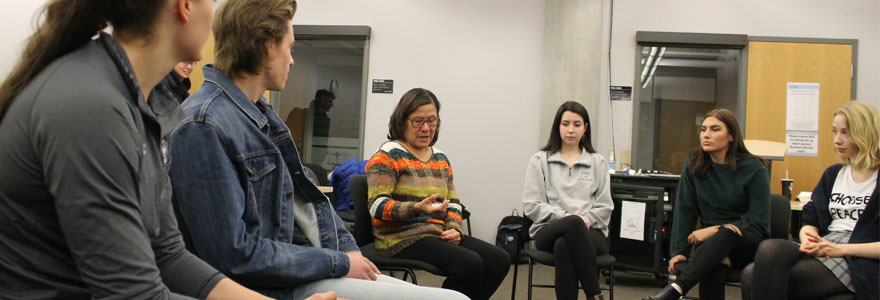News and Updates
Contact
Faculty of Social Science
Social Science Centre
Room 9438
Western University
T. 519-661-2053
F. 519-661-3868
E. social-science@uwo.ca
First Nations Studies Program officially renamed to Indigenous Studies program
July 30, 2019
Story and photo by Rob Rombouts
The First Nations Studies program has officially been renamed as the Indigenous Studies program.
The change is intended to be reflective of a more inclusive understanding of Indigenous issues in Canada and abroad, and reflects the inclusion of all Indigenous people - Inuit, Métis, First Nation, urban, non-status. The program name change was officially approved at the June 7 meeting of the University Senate.
“The program review is the outcome of a change that has been in the making for a long time,” said Janice Forsyth, Director of the Indigenous Studies program. “It is a reflection of people’s broader interests in Indigenous culture, not just First Nations history and cultures.”
Diana Lewis, Assistant Professor in Indigenous Studies, said the former title of First Nations Studies could lead students to believe the courses are only intended to discuss First Nations issues.
“Indigenous includes Métis, Inuit and people living off reserve. Half the population of Indigenous people live in urban centres,” said Lewis.
Serena Mendizabal is a 4th year student in Indigenous Studies and Media, Information and Techno-culture. For Mendizabal, Indigenous Studies is “more universal, and more of an all-encapsulating term that can provide a broader perspective.”
Tehya Quachegan is a 3rd year student in Indigenous Studies and Psychology, and president of the Indigenous Students Association. She said the change has already occurred in many other universities, and it may make the program more attractive to students.
“When you say First Nations Studies, it makes it seem that you are only studying First Nations,” said Quachegan. “If it is called Indigenous Studies, it is open to more peoples.”
The program already includes courses on the Indigenous experience in other areas, such as courses on the cultures of the Caribbean, Latin America and the Pacific.
The name change further connects researchers and students to an international experience.
“This is a way to broaden the vision for what it means to be Indigenous” said Forsyth. “It fits within the broader international perspective the university takes.”
Forsyth noted that Indigenous researchers at the university are already working to foster relationships with Indigenous peoples from abroad.
Lewis said the name could provide a broader insight for international understanding of Indigenous issues.
“We get international students who are non-Indigenous and our courses are often the first time they have contact with any sort of Indigenous content,” said Lewis. “It makes them think about Indigenous people globally.”
“Indigenous issues are shockingly similar in any colonial country,” said Lewis. “Socio-economic issues are the same, and Indigenous peoples are experiencing marginalization and poverty. Issues like colonialism are pretty consistent, no matter where it happened.”
When considering the change, the students highlighted the importance of being able to identify with the issues being discussed in the program.
“I personally identify as First Nation, and we need to be sure to avoid generalization when using the term Indigenous,” said Mendizabal. “It can be detrimental because of the broadness. We can take away the hardship experiences. It’s important that Indigenous Peoples be pluralized to show that there are different experiences.”
“It is kind of difficult because it is such a broad term. It encompasses a lot of different groups” said Quachegan. “A lot of people choose how they want to identify.”
More than just a re-branding, the change will impact courses and research.
Forsyth said the program has already hosted one retreat where attendees were asked to consider what kind of knowledge and skills students need upon graduation. The attendees included staff from Indigenous Services, as well as students and university-community representation.
Lewis believes the broader approach will provide better research perspectives as well.
“Indigenous methods can be applied to Indigenous peoples globally,” said Lewis.
“I hope it brings more representation from global perspective and see how all Indigenous people can work together,” said Mendizabal, “and maybe gain from the First Nations perspective that was foundation of program and maybe gain on a broader landscape.”

